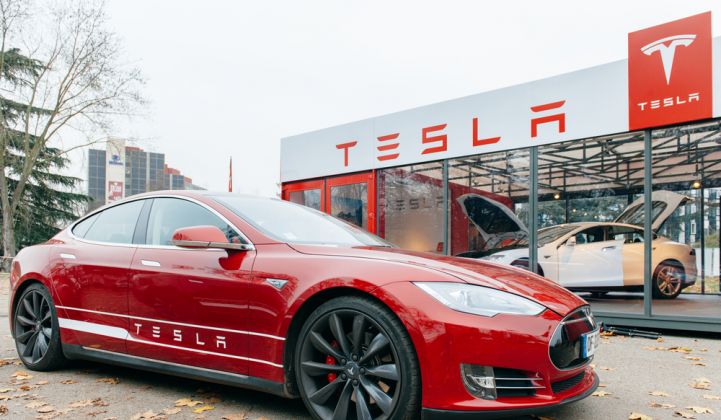Three top global battery makers -- Panasonic, LG Chem and Samsung SDI -- are battling to be the dominant lithium-ion cell supplier to the nascent electric vehicle market.
Panasonic is the current front-runner, having bet heavily on Tesla Motors, but the leaderboard could see a shakeup in the next five years, according to a new report from Lux Research.
While plug-in vehicle sales in the U.S. have dipped in response to low oil prices, global EV demand continues to grow. Almost all major automakers have already introduced an EV model, and several plan to expand their EV lineup in the coming years. By 2020, automakers are expected to buy more than $30 billion worth of lithium ion batteries for all-electric and plug-in hybrid cars.
The battery manufacturers supplying this industry have taken markedly different approaches so far, according to Cosmin Laslau, senior analyst at Lux Research.
“We’re seeing two very different strategies,” he said. "Panasonic took this really risky bet with Tesla that’s gotten them to No. 1. But we also have a longer-term strategy that’s brewing from LG Chem, and to a lesser extent Samsung SDI, targeting the more established OEMs, that should really start to see some payoffs in five years or less.”
LG Chem's automotive customers include General Motors, Renault SA and Daimler AG. Samsung SDI supplies EV batteries to BMW and Volkswagen. Panasonic predominantly supplies Tesla, but also works with Volkswagen and Ford.
Panasonic has averaged a 39 percent market share in EV batteries since 2014. Earlier this year, its share jumped up to 49 percent as Tesla experienced a particularly good first quarter. Sales of Tesla’s high-performance Model S haven’t been hindered by low oil prices nearly as much as have economy plug-ins.
But while sales have been strong, Tesla vehicles still only account of 0.1 percent of global auto sales. Meanwhile, the world’s major automakers are stepping up their EV game, both in response to new government regulations and to catch up with Tesla. The Volkswagen Group, which sold 9.6 million units worldwide in 2014, plans to offer 20 plug-in options by 2020.
In a likely scenario, Panasonic will continue to have the most plug-in vehicle battery share, with 51 percent of the market in 2020 versus 24 percent for LG Chem. Tesla is unlikely to meet its 500,000 unit by 2020 goal, but can feasibly sell half that amount, according to Lux.
However, a surge in activity from more established automakers could cause a shift in the battery supplier market, with LG Chem unseating Panasonic. According to Lux Research, three things would have to happen for LG Chem to take the lead.
First, an average of 6 percent of vehicles sold by German automakers would need to be plug-ins. For comparison, the global EV sales average is 1 percent. In this scenario, demand for EV batteries becomes 21 percent from VW, 9 percent from BMW and 9 percent from Daimler. Assuming Tesla sells 250,000 EVs in 2020, LG Chem could edge out Panasonic through its contracts with VW and Daimler.
German OEMs make a lot of smaller EVs with lower price points, so getting to 6 percent EV penetration is feasible, but it’s still aggressive, said Laslau. In contrast, Tesla cars don’t have to reach a mass scale for Panasonic to make lots of sales, because of the Model S’s large 70- to 90-kilowatt-hour battery packs.
Second, it’s actually not enough for German automakers to reach 6 percent plug-in penetration to supplant Panasonic; LG Chem also needs to become the majority supplier to the VW Group.
The German automotive brand currently has agreements with all three major battery manufacturers. Both LG Chem and Samsung were recently selected as the suppliers for Audi’s new long-range EV SUV, a concept version of which will be revealed next month at the Frankfurt Auto Show. Panasonic, meanwhile, is the supplier for the VW E-Golf.
“If LG Chem can win the bulk the majority of those battery shipments to VW, that’s going to be a key thing,” said Laslau. “If it’s just an equal split between the three, that’s not going to allow them to climb to the No. 1 spot.”
If both of those things happen, it’s possible for LG Chem’s market share to reach 40 percent in 2020, surpassing Panasonic at 35 percent. But in a more likely case, LG Chem needs a third victory, which is to become the preferred supplier to the Renault-Nissan Alliance.
Renault-Nissan, which is expected to account for 9 percent of plug-in vehicle battery demand in 2020, currently gets most of its batteries from NEC, through a joint venture called AESC. But Nissan has expressed dissatisfaction with the partnership, said Laslau.
“CEO Carlos Ghosn has [said] openly that in future, [the Alliance] might very well to go multiple suppliers, and that AESC’s incumbent position is not safe,” he said.
LG Chem already supplies batteries to Renault. If it can expand to the broader Alliance, the Korean manufacturer could cement its victory over Panasonic.
Another question in all of this is where all of the other battery suppliers fit in.
“For everyone else, to put their foot in the door and put wins on the board, they have to start risking more on innovative technology that’s a generation beyond what Panasonic and others are doing,” said Laslau.
Today, the market is still reliant on lithium-ion batteries with a liquid electrolyte. According to Lux, the best opportunities lie in solid-state batteries and lithium-sulfur batteries. The latter, however, is a bit more of a long shot, said Laslau.



